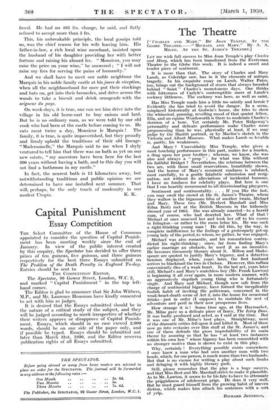The Theatre
[" CHARLES AND MARY." BY JOAN TEMPLE. AT TIIE
GLOBE THEATRE. " MICHAEL AND MARY." By A. A. MILNE. AT THE ST. JAMES'S THEATRE.] LET me wish full success to Miss Joan Temple's play Charles and Mary, which has been transferred from the Everyman Theatre to the Globe this week. It is indeed a sweet and tender piece of sentiment.
It is more than that. The story of Charles and Mary Lamb, as Coleridge saw, has in it the elements of antique tragedy. In his exquisite essay on Lamb, Walter Pater, too, brings out the background of storm that always brooded behind " Saint " Charles's monotonous days. One thinks with bitterness of Carlyle's contemptible sneer at Lamb's cockney littleness. The cockney was hero, as well as saint.
Has Miss Temple made him a little too saintly and heroic ? Evidently she has tried to avoid the danger. In a scene, misplaced historically at Godwin's house, she tries to shoiv the whimsical, punning, revelling mood of that quaint fellow, Elia, and an equine Wordsworth is there to moderate Charles's derision of a bore. Yet certainly Mr. Peter Ridgeway's personality and delicate performance make Charles more prepossessing than he was, physically at least, if we may judge by the Hazlitt portrait, or by Maelise's sketch in the Victoria and Albert. Museum. What makes Lamb so lovable is, partly, his weaknesses.
And Mary ? Unavoidably Miss Temple, who gives a most touching performance in this part, makes her a burden, a drag upon her poor brother ; whereas, we know, she was also and always a " prop " ; for what was Elia without his faithful Bridget ? Nevertheless, the relations between the two are, with those small reservations, beautifully shown. And the horror of Mary's recurrent madness is subdued, most carefully, to a gentle fatalistic submission and resig- nation, not without its alleviations of incidental humour. I have no fondness for celebrity plays. But here is one that I can heartily recommend to all discriminating playgoers.
Sentiment and sentimentality. . . . If you like the last, . you may swell the crowd at the St. James's Theatre, where they wallow in the bigamous bliss of another twain, Michael and Mary. These two (Mr. Herbert Marshall and Miss Edna Best) met at the British Museum in the hideously dressed year of 1905. She was already married—to a horrid man, of course, who had deserted her. What of that Michael at once annexed her and took her off to his rooms in Islington—or rather to the room below his. He was such a right-thinking young man ! He did this, by the way, in complete indifference to the feelings of a grotesquely got-up young lady of the period, to whom, we gather, he was engaged.
Michael was also romantic, and his romanticism contra. dicted his right-thinking ; since, far from finding Marys earlier marriage an obstacle, he used it as an incentive. He becomes tiresomely literary about it. Milton and Shake- speare are quoted to justify Mary's bigamy, and a detective heroism displayed, when, years later, the first husband arrives to blackmail the two in Chelsea. However, this ruffian conveniently dies of a weak heart. In the last act, years later still, Michael's and Mary's matchless boy (Mr. Frank Lawton) is beginning it all over again, in more modern manner, with an aggressively slapdash young thing who is fortunately single. And Mary and Michael, though now safe from the charge of sentimental bigamy, have formed the inexplicably foolish habit of inviting the policeman, concerned in the weak-heart-death scene of Act 2, into the house for occasional drinks—just in order (I suppose) to maintain the zest of adventure and peril in their now prosperous lives.
How strange it is ! Some time ago, at the Haymarket, Mr. Milne gave us a delicate piece of fancy, The Ivory Door. It was badly produced and acted, as I said at the time. But it was one of Mr. Milne's best plays. Straightway, most of the dramatic critics fell upon it and killed it. Most of them now go into ecstasies over this stuff at the St. James's, and one of them defends the gross improbability of its main theme by assuring us that he has " at least two instances within his own ken " where bigamy has been committed with no stronger motive than is shown to exist in this play.
Why, certainly ! Everything possible exists somewhere, I once knew a man who had seen another man with two heads, which, for one person, is much worse than two husbands: But that is no excuse for writing a play about such freaks and deluging it with highly literary gush.
Still, please remember that the play is a huge success,
and that Miss Best and Mr. Marshall strive to make it plausible. As to Mr. Lawton, it seems to be his fate to have to attenuate the priggishness of adolescent prigs. He does it very well. But he must guard himself from the growing habit of uneven diction, which makes him attack his sentences with a sort of yelp.
RICHARD JENNINGS,
























































 Previous page
Previous page